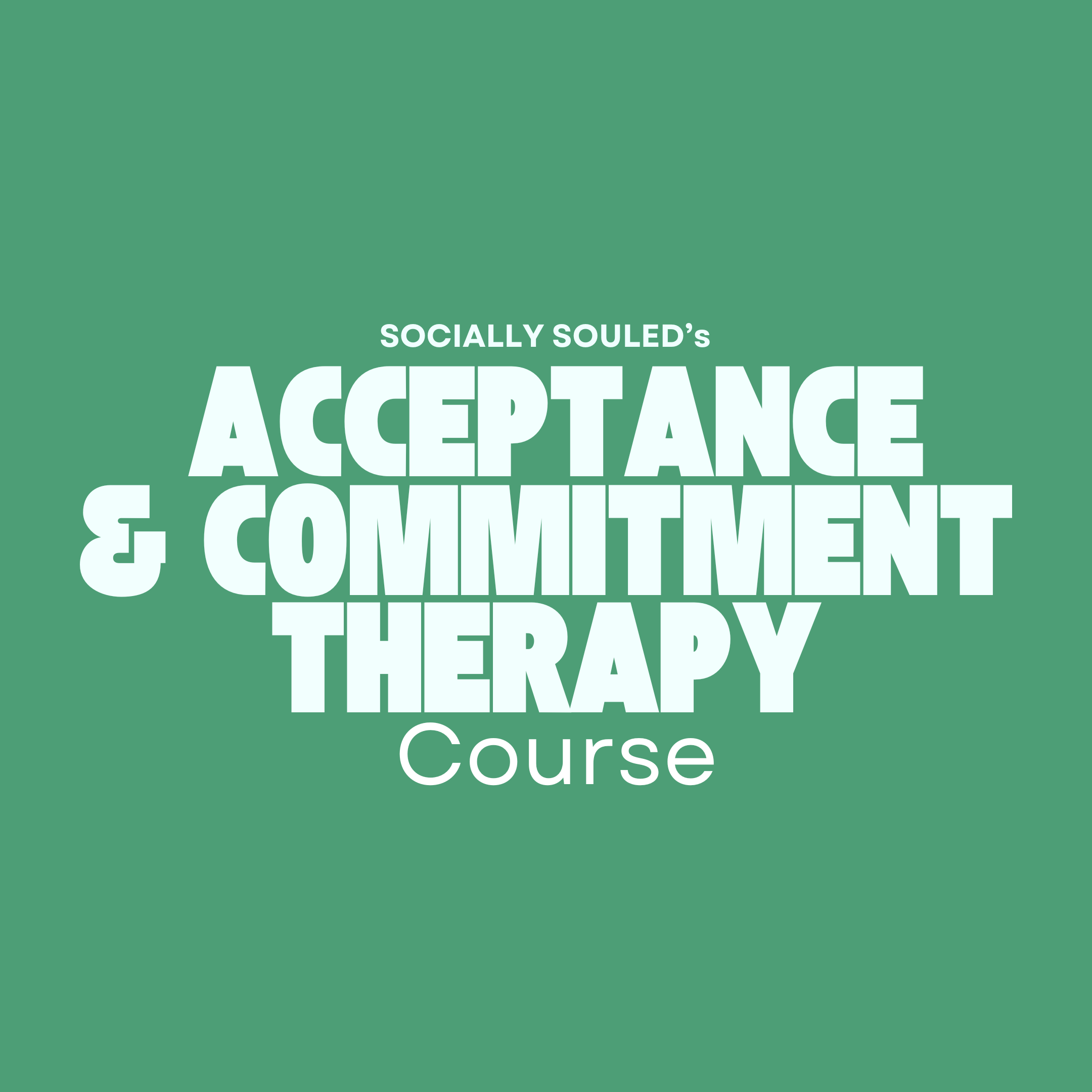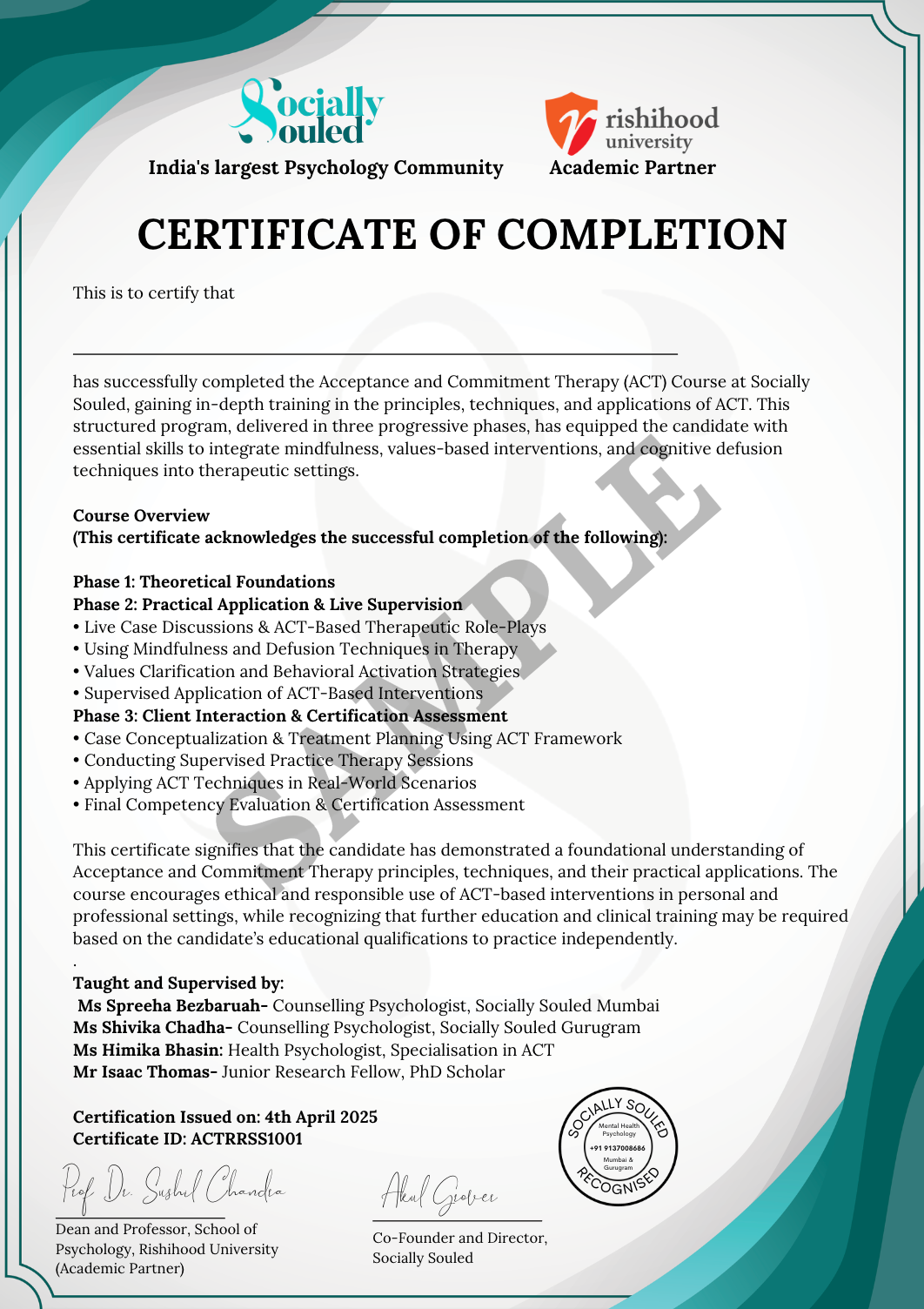
Acceptance and Commitment Therapy Course
Why Choose This Program?
Program Structure: A 3-Phase Learning Experience
-
Self-Paced Learning (Phase 1)
Learn the Theory -
Live Training (Phase 2)
Practice the Skills -
Supervised Cases (Phase 3)
Gain Real World Experience
Phase 1: Self-Paced Learning (Theory & Foundation)
📌 Objective: Build a strong foundation in ACT before moving to practical application.
Learn at your own pace with structured pre-recorded modules.
✔ Bite-Sized Video Lessons
✔ Downloadable ACT Workbooks & Therapy Worksheets
✔ Quizzes & Thought Exercises for Active Learning
✔ Guided Self-Reflection & Journaling Prompts
Exclusive Access to Our Learning Management System (LMS) for Self-Paced Modules
Topics Covered:
- Introduction to ACT – History, Research & Effectiveness
- The ACT Model – Psychological Flexibility & The Six Core Processes
- Core ACT Techniques – Cognitive Defusion, Acceptance, & Self-as-Context
- ACT Skills Modules: Values Clarification, Present-Moment Awareness, Committed Action
- Experiential Exercises – Metaphors, Mindfulness, & Perspective-Taking
- Functional Contextualism & Relational Frame Theory (RFT) Basics
- Structuring ACT Therapy Sessions for Clients

Educators & Supervisors
Mrs Somdutta Ghosh: Counselling Psychologist, ACT Practitioner, Psycho-oncologist
Phase 2: Live Training & Skill Development
📌 Objective: Apply ACT skills in interactive live training, role-plays, and case discussions.
✔ Weekly Live Classes (No Lectures! Hands-On Practice)
✔ Breakout Room Activities & Small Group Discussions
✔ Trainer-Led Therapy Demonstrations & Case Reviews
✔ Personalized Feedback on ACT Skill Application
Topics Covered in Live Training:
- ACT Case Formulation – Conceptualizing Client Issues
- Live Q&A with Instructors – Clarify doubts from self-paced learning.
- Therapy Demonstrations – Watch Expert Sessions
- Mock Therapy Sessions – Role-Playing ACT Skills
- Guided Supervision & Peer Learning – Group discussions & structured feedback.
Phase 3: Supervised Casework & Certification
Objective: Transition from training to real-world therapy experience.
✔ Direct Trainer Feedback on Your Sessions.
✔ Case Study Reviews & Real-World Problem Solving.
✔ Supervised Skill Development & Therapist Growth.
Certification Process:
Final Submission of Therapy Casework & Reports.
Evaluation of Skills through Supervision & Case Analysis.
Supervised Practice & Certification Requirements:
- Conduct Therapy Sessions with Clients.
- Submit Session Notes & Case Reports for Trainer Evaluation.
- Develop a Treatment Plan & Case Conceptualization.
- Participate in Supervision Calls & Peer Reviews.
- Pass the Final Competency Assessment for Certification.
How the Acceptance & Commitment Therapy (ACT) Certification Can Be Used
1️⃣ Enhance Your Expertise in Evidence-Based Therapy
3️⃣ Facilitate Group Workshops & Self-Help Programs
5️⃣ Apply ACT Principles in Everyday Life & Professional Roles

2️⃣ Integrate ACT into Coaching & Personal Development
4️⃣ Work Alongside Licensed Mental Health Professionals
6️⃣ Build a Strong Foundation for Specialization in ACT & Behavioral Therapies

What You Get with This ACT Training Program
- Comprehensive Learning in 3 Phases – Theory, Practical Training & Real-World Application.
- Access to LMS with Downloadable ACT Workbooks & Therapy Resources
- Live Training with Role-Plays, Case Discussions & Q&A Sessions.
- Hands-On Supervised Therapy Practice with Real Clients.
- Mentorship & Support from Industry Experts.
- Official Certification Recognized for Career Growth.
Who is This Course For?
-
Psychology Students and Graduates
Looking for practical ACT training. -
Counselors & Mental Health Professionals
Wanting to enhance their ACT skills. -
Social Workers and Educators
Applying ACT principles and techniques in community settings. -
Anyone Interested in ACT
Seeking structured training to understand and apply ACT techniques.
Frequently Asked Questions (FAQs)
-
The program is self-paced + live training. On average, students complete it in 3-4 months, depending on how quickly they move through the phases.
-
No, this course is beginner-friendly! Whether you're new to ACT or already working in psychology, this structured program helps you build and refine your skills.
-
All live classes are recorded and uploaded to our LMS. You can access them anytime.
-
Yes, the course is designed to provide you with actionable skills and techniques that can be immediately implemented in your clinical practice. Case studies, role-playing, and interactive sessions facilitate hands-on learning that ensures you can apply the concepts effectively.
-
In Phase 3, you’ll conduct live therapy sessions and submit recordings for trainer feedback. You’ll also participate in weekly supervision calls for structured guidance.
-
- After completing the course, participants may have access to a community forum for ongoing discussion, periodic webinars for course alumni, and opportunities for supervision or consultation on challenging cases.
